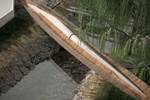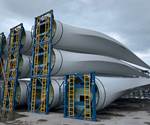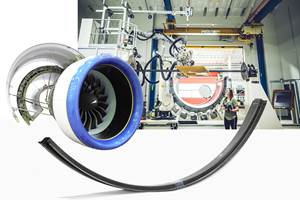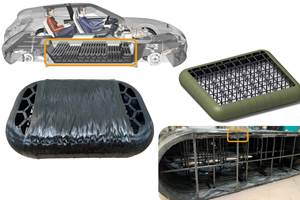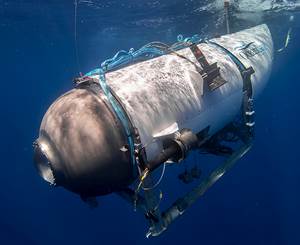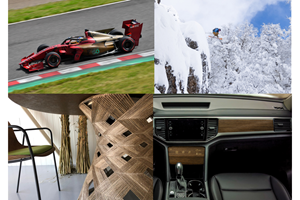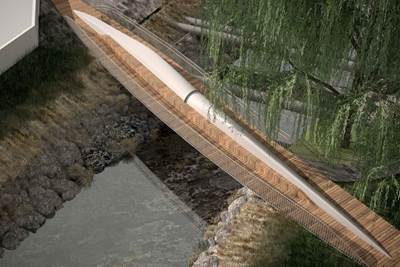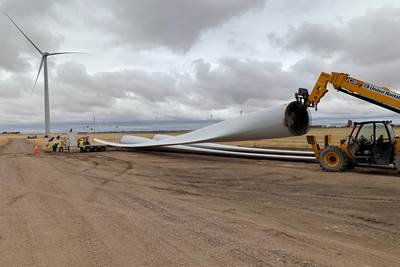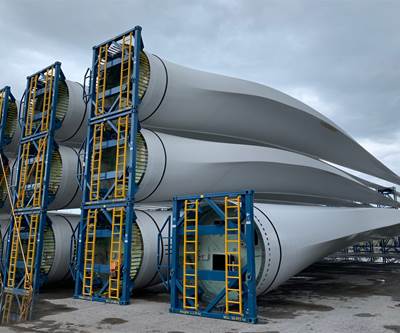DecomBlades consortium awarded funding for a cross-sector wind turbine blade recycling project
A 10-partner consortium has received funding for a three-year R&D project aiming at commercialization of sustainable techniques for recycling wind blades.
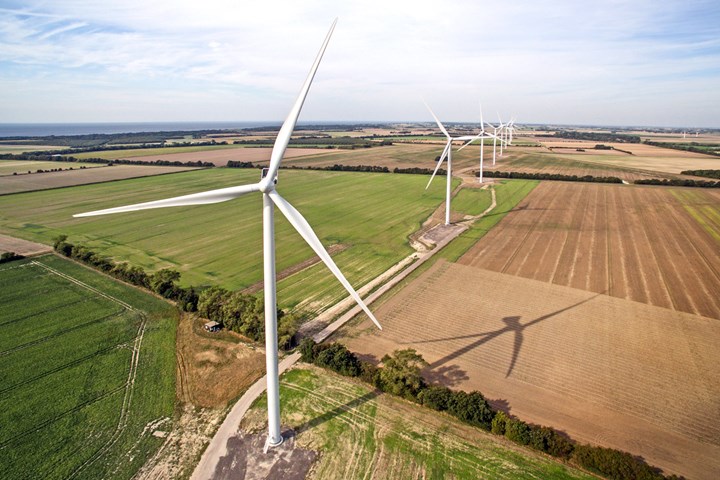
Announced by Siemens Gamesa (Zamudio, Spain) on Jan. 25, a 10-partner European consortium has been awarded funding from Innovation Fund Denmark’s Grand Solutions program to co-fund a three-year project aimed at commercializing the recycling of wind turbine blades using recyclable solutions. The consortium partners for the project, called “DecomBlades,” are Ørsted, LM Wind Power – a GE Renewable Energy business, Vestas Wind Systems A/S, Siemens Gamesa Renewable Energy, FLSmidth, MAKEEN Power, HJHansen Recycling, Energy Cluster Denmark (ECD), University of Southern Denmark (SDU) and Technical University of Denmark (DTU).
Siemens Gamesa reports that 85-95% of a wind turbine can be recycled, including the estimated 2.5 million tons of composite materials used in wind turbines, but cost-efficient recycling of compostie materials remains a challenge.
DecomBlades research will focus on three specific composite recycling processes:
- Shredding of wind turbine blades so the material can be reused in different products;
- Use of shredded blade material in cement production; and
- Pyrolosis methods, which separate composites into fiber and resins using heat
John Korsgaard, senior director of engineering excellence and chair of the DecomBlades Steering Committee, comments, “The wind power industry is committed to finding a sustainable way to dispose of these decommissioned wind turbine blades with respect to the environment, health and safety of workers, energy consumption and cost, and we simply don’t yet have solutions that meet all those criteria. To create viable, sustainable, cost-efficient solutions for recycling wind turbine blades, it is essential that composite materials from blades can be incorporated into similar resource streams and processed in the same facilities.”
The 10 project partners, which each have a foundation in Denmark, are:
Ørsted (Fredericia, Denmark) the project lead for DecomBlades, is the world’s largest owner and developer of offshore wind farms with more than 6.000 employees globally.
University of Southern Denmark, SDU (Odense), will conduct environmental and economic performance assessments of the different supply chains and apply a cutting-edge hybrid assessment frame based on value chain analysis, lifecycle assessment, material flow analysis and multi-criteria decision support. This includes research into further development of the economic and environmental sustainability assessment frameworks that are relevant for the Danish wind turbine industry and other areas in terms of optimum recycling of composites materials.
Technical University of Denmark, DTU (Kongens Lyngby), will contribute within the fields of material characterization, engineering, assessment of material properties of reused glass fibers, surface properties and investigate the possibilities of increasing the quality and value of fibers obtained from pyrolysis.
MAKEEN Power (Randers, Denmark) will lead the work on the pyrolysis technology and will design and build a pilot pyrolysis facility dedicated to treatment of blade materials. The pilot facility will be developed and based upon existing MAKEEN Power technologies. Furthermore, MAKEEN Power will seek commercialization of pyrolysis facilities for recycling of composite materials as well as a market for recovered solids to replace new materials.
HJHansen Recycling (Odense, Denmark) will lead the work regarding the common prerequisite for all three technologies: preprocessing, i.e., cutting of blades to ensure it is possible to transport blades to recycling facilities in an economically-viable way. Furthermore, HJHansen will work with solutions on shredding of the blade materials and explore the market for use of shredded blade materials in new products.
FLSmidth (Copenhagen, Denmark) will investigate the possibilities of using shredded blade material and products from the pyrolysis process in the cement production process. Use of blade materials in cement production can decrease the environmental impact from cement production. As a knowledge and technology provider to the cement industry, FLSmidth’s main objective within the DecomBlades project is to evaluate possible solutions for incorporating blade materials in cement production on a global scale.
Vestas Wind Systems A/S (Aarhus, Denmark), the world’s largest wind energy OEM, brings its expertise in the composition and manufacture of turbine blades. In early 2020, Vestas introduced ambitious targets to increase the recyclability rate of its rotors, as well as an increased focus on addressing the decommissioning of existing blades. Vestas committed to producing zero-waste turbines by 2040. In support of the DecomBlades project, Vestas offers to provide blade samples for testing purposes. Vestas contributes a broad spectrum of knowledge on the expected lifetime of a blade, its production volume, and on assessing the potential for recyclability.
Siemens Gamesa Renewable Energy, a leading global supplier of wind power solutions with installed products and technology in more than 75 countries and a total capacity base of over 105 gigawatts (GW), the company will contribute its extensive knowledge on blade structure and design, market expectations to commercialization of recycling of composites as well as promoting circularity in the wind sector to the project.
LM Wind Power – a GE Renewable Energy business (Kolding, Denmark), a leading designer and manufacturer of wind turbine blades, with more than 228,000 blades produced since 1978 corresponding to 113 GW installed capacity, will lead the establishment of product disposal specifications for wind turbine blades. In order to support efficient waste management of decommissioned blades and new business models for recycling methods, LM Wind Power will work with project partners Siemens Gamesa Renewable Energy and Vestas Wind Systems A/S to contribute knowledge on expected blade lifetime and to assess the value of recycled materials.
Energy Cluster Denmark, ECD, is the national Danish innovation network and cluster organization for the entire energy sector and gathers Danish companies to be part of these new supply chains. Energy Cluster Denmark will develop new research and development projects based on the opportunities emerging from the technical solutions being developed and matured during the DecomBlades project.
Related Content
The potential for thermoplastic composite nacelles
Collins Aerospace draws on global team, decades of experience to demonstrate large, curved AFP and welded structures for the next generation of aircraft.
Read MoreTU Munich develops cuboidal conformable tanks using carbon fiber composites for increased hydrogen storage
Flat tank enabling standard platform for BEV and FCEV uses thermoplastic and thermoset composites, overwrapped skeleton design in pursuit of 25% more H2 storage.
Read MoreThe lessons behind OceanGate
Carbon fiber composites faced much criticism in the wake of the OceanGate submersible accident. CW’s publisher Jeff Sloan explains that it’s not that simple.
Read MoreNatural fiber composites: Growing to fit sustainability needs
Led by global and industry-wide sustainability goals, commercial interest in flax and hemp fiber-reinforced composites grows into higher-performance, higher-volume applications.
Read MoreRead Next
Recycling end-of-life composite parts: New methods, markets
From infrastructure solutions to consumer products, Polish recycler Anmet and Netherlands-based researchers are developing new methods for repurposing wind turbine blades and other composite parts.
Read MoreGE announces U.S. blade recycling contract with Veolia
Decommissioned composite wind turbine blades will be recycled into cement production to replace raw material needs, while still enabling a net-positive environmental impact.
Read MoreDecommissioned wind turbine blades used for cement co-processing
An initiative to recycle wind turbine blades includes the use of recycled glass fiber composites for cement manufacturing, replacing raw material and saving energy.
Read More
.jpg;width=70;height=70;mode=crop)
